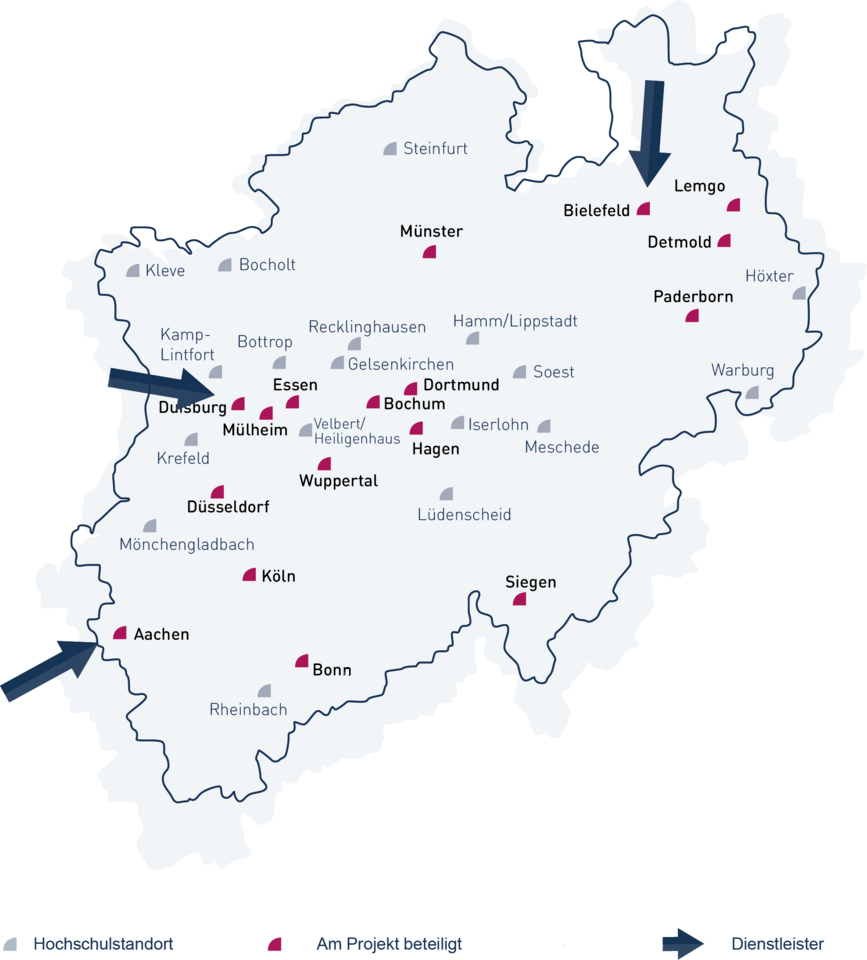Development of the state-wide service Datensicherung.nrw
From NRW-universities for NRW-universities
Recent damage events drastically demonstrate that it is urgently advisable not to have a structurally, technically and spatially separate backup copy. The consortium is meeting this challenge in the preliminary project Datensicherung.nrw and is developing a sustainable and up-to-date storage infrastructure as well as the corresponding service - beyond the respective university boundaries!
The current practice of university-internal data backup is hardly sustainable. This was the result of workshops within the consortium. On the one hand, the use cases and the system landscape of the user systems have become highly specialized, and on the other hand, the users' demands on the service quality provided go much further than before.
Data persistence, availability and security
There is a demand for virtually uninterrupted availability and guaranteed data persistence. This has led to the need to cover more use cases with possibly several backup products and a higher quality of service compared to the current status - a need that could not be met in the previous operating models.
Datensicherung.nrw
The preliminary project
As part of the preliminary project Datensicherung.NRW (DaSi.nrw), an operating model was developed to establish a cross-university data backup system in and for NRW. The aim was to develop the technical, organizational and process-related boundary conditions and requirements. The new operating model, based on the division of labor, is unique in this form in NRW. In close coordination, aspects were worked out for universities offering and universities receiving services, which were then incorporated into the requirements for the infrastructure products to be procured.
Universities absolutely need storage infrastructures in order to perform their tasks. The data to be backed up is heterogeneous. Different platforms as well as data from different disciplines pose a challenge for a modern storage infrastructure. The variety of data covers e-mails, teaching and learning materials as well as procurement and accounting, personnel data and much more. Permanent and reliable availability of all data stocks thus represents an essential building block in the context of digitization in research, teaching and administration.
Transition to active operation
Implementation phase
To support the changeover process and the handling of the new software solution, role-specific training was coordinated after the software was procured. The individual training blocks were recorded and are thus also available to the consortium partners for subsequent use.
With the establishment of a cross-university self-service based on roles and the associated single point of information, i.e. a uniform, common documentation portal for all software users, central entry points are created that facilitate the implementation of changes and adjustments. This serves not only to ensure the integrity of the instructions provided, but also to reduce the documentation maintenance effort at the various university sites confronted with the changeover.
The implementation of essential aspects such as the establishment of uniform onboarding processes or the development of the service structure was carried out in work packages. The cooperative design of the processes, with recourse to the expertise available among the project partners, leads to synergies and active collaboration during the implementation phase.


